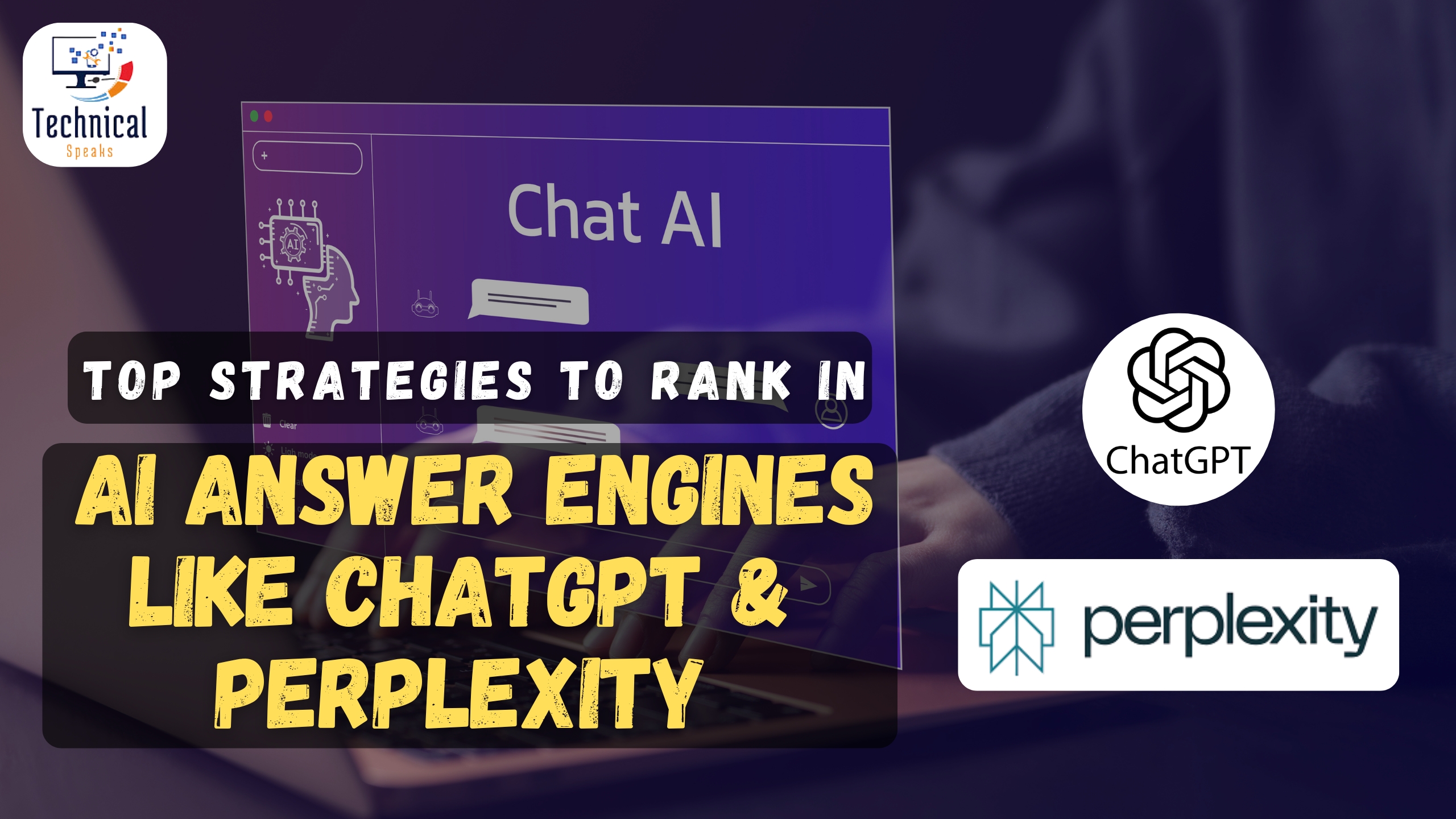Digital marketing is changing faster than it ever has. People used to talk a lot about how to make their websites rank higher in Google. People say that ChatGPT, Perplexity, Claude, and Gemini are the next big things in search engines that use AI. These sites don’t just give you a list of links; they also give you short, clear answers.
That will have a big effect on businesses, people who make content, and SEO experts. How do you make sure that people still see your brand or content when AI models are “answering” users instead of sending them to websites?
This blog will explain what AI answer engines are, how they choose their sources, and the best ways to make sure that your content is included in their answers.
Getting to know AI answer engines
We need to know what we’re up against before we make any plans.
ChatGPT (with browsing turned on) and Perplexity AI are two AI answer engines that don’t work the same way as regular search engines. They use natural language processing (NLP) to figure out what people are asking and answer in a way that sounds like a conversation. They don’t just show you ten blue links. They look at hundreds of web pages and pick out the most important facts to give you a full answer that sounds like a real person.
“How can small businesses best let people know about themselves?” someone might ask. You might find blogs or articles if you search for “—” on Google. But ChatGPT or Perplexity will quickly give you a list of the best strategies, usually with links or citations to the original sources at the end.
Now you need to learn how to write in a way that AI can use and trust.
1. Make sure your writing is complete, well-organized, and correct.
AI answer engines should be easy to understand, reliable, and have the right context. That means that articles that are short or only cover the basics won’t stand out as much anymore.
Instead, write articles that are long and useful. You should write enough in each post to answer any questions people might have about the subject.
Some thoughts:
- Discuss the “what,” “why,” and “how” of each topic.
- Use bullet points and clear headings (H2, H3) to help AI figure out how your text is set up.
- Use numbers, examples, or case studies to back up what you say.
- The AI likes facts and information that are easy to find, so don’t use too many words.
Write a detailed guide like “10 Actionable SEO Strategies for 2025 Backed by Data” instead of a general post like “Best SEO Tips.” Back up what you say with examples, results, and expert opinions.
AI engines like content that is well-organized and full of information because it makes it easier for them to summarize.
2. Use semantic and conversational search to its fullest.
AI tools don’t just look for words; they also try to figure out what those words mean. This is what it means to look for things based on what they mean.
Your content shouldn’t have a lot of keywords. But you should still answer questions in a way that sounds like how people ask or type them.
You can do these things:
- Use questions as titles, like “What does AI do to SEO?” “What do I need to do to get the best score on ChatGPT?”
- “AI answer engine,” “conversational AI search,” and “AI-powered discovery tools” are all terms that mean the same thing or are related.
- Talk to someone when you write. Don’t use words that sound too technical or robotic.
When your content has a lot of information and sounds more natural, the AI can better understand it and use it.
3. Learn more about the subject
AI answer engines need to be honest and reliable. They usually talk about people or websites that are very good at something.
Choose one thing to learn everything there is to know about instead of writing about everything. This could be about health, school, money, technology, or online marketing.
How to become an expert on a subject and learn more about it:
- Write a lot of good pieces about the main topic.
- There are links to other articles that are like this one.
- To keep your content interesting, add new facts and ideas to it.
- Get links from well-known sites in your field.
It tells AI engines that “this website always has good information on this subject.” This increases the chances that your site will be included in short answers.
4. Only use sources and information that you can trust.
People can use AI models to find out if something is true. People are more likely to trust and share information that comes from research, expert opinions, or data that they know is true.
To be sure:
- Link to government studies, white papers, or reports.
- Talk about what the experts say or what is common in the field.
- You can look at this year’s data to see if the information you have is still correct.
If you want your writing about “AI in marketing” to look more trustworthy to AI, you should include numbers from reliable sites like HubSpot or Gartner.
Keep in mind that AI models are taught to reward accuracy. If your content looks more trustworthy, people are more likely to use it as a source.
5. Businesses should care most about SEO.
AI answer engines learn about things by looking at names, groups, brands, people, places, and other things. When you make your content clear, AI can better connect what you say to things that happen in the real world.
For instance, the AI uses the words “Elon Musk,” “Tesla,” and “SpaceX” in your article to figure out what you mean by “business leadership,” “innovation,” or “technology.”
You can do this with:
- Using schema markup to tell your site what things are.
- Always put the name of your brand or author in your work.
- You should make a “About” page and bios for each author that show how much you know.
The goal is to make your content easy for computers to read so that AI tools can quickly connect it to what they already know.
6. Make the most of Perplexity’s citation system.
AI always gives credit to where it gets its information, but ChatGPT doesn’t. So, you should try to make your content a good source of information.
How to do it:
- Use facts that are true, clear, and easy to find.
- AI models can easily give definitions, lists, and numbers.
- At the beginning of your articles, give short, clear answers. This is the best way to get AI to work.
- AI crawlers should still be able to get to your site even if you have a robots.txt file.
You could picture each paragraph as a box where AI could put an answer.
7. Be unique online
AI answer engines are paying more and more attention to how popular and well-reviewed a business is on the internet. If more than one trustworthy site talks about a person’s name, business, or blog, you can trust that site.
Here are some things you can do to make your online presence better:
- Post as a guest on well-known websites.
- Join groups of experts or panels in your field.
- Don’t change your profiles on sites like LinkedIn, Medium, and Quora.
- Get links and mentions from sites you know you can trust.
When people and computers see that your online reputation is linked, they trust you more.
8. Always check to see if your content is new and up to date.
AI models like to use the newest data. If your article hasn’t been updated in a while, AI-generated answers are less likely to include it.
Be sure to:
- Include more examples and numbers.
- Change the old links and screenshots.
- Add information from recent studies or trends.
In ecosystems where AI is always changing, regular updates make sure that your content is still useful and easy to find.
9. Do technical SEO and help search engines find their way around your site.
AI tools do more than just check where a site is on Google; they also look for information on the web. This means that the technical part of your site is very important.
Please read:
- Design that works well on tablets and phones and loads quickly.
- Tags, structured data, and sitemaps that do what they’re supposed to do
- No links or pages that don’t work.
- When the content is in a clear order, it’s easy to read.
If a site is technically sound, search engines and AI models can find it more easily.
10. Personalize it
It looks like content that is more about people is doing better as AI gets closer to the world.
AI answer engines are designed to find real value, not just add more keywords. So, when you make content:
- Please tell us what you think or what you’ve been through.
- Use stories or examples from real life.
- Don’t write like you’re talking; talk like you’re writing.
Your content will show up in more searches, both traditional and AI-driven, if it connects with people on both an emotional and practical level.
Final Thoughts
ChatGPT and Perplexity are two AI answer engines that will help you find things online even faster. It’s not enough to just do well on Google anymore. You also have to be someone people can count on.
To do well, you need to be honest, clear, and in the right place. Make content that is useful, easy to read, and that people will trust over time.
Don’t try to “trick” AI-powered sites into giving you higher rankings. Instead, help them find the best and most useful answers.
That’s how people who use conversational search will find your brand.








